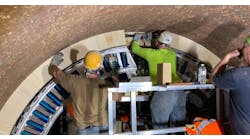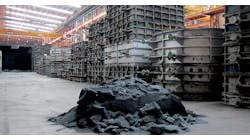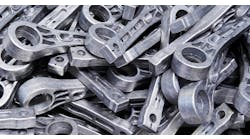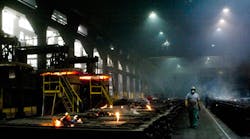Columbus Castings is negotiating to sell itself to an unnamed buyer, but has made its 799 employees aware that a failure to secure that new equity stake could result in a shutdown of the Ohio steel foundry. The producer of cast parts for railcars and railroad structures revealed that much of its precarious situation to employees, and to the Ohio Department of Job and Family services in a filing that lists June 21 as the critical date.
The filing fulfills Columbus Castings’ legal obligation under the federal Worker Adjustment and Retraining Notification Act (WARN Act), which requires employers with 100 or more employees to provide a 60-day advance notification of plant closings and mass layoffs.
Other details of the foundry’s situation, like the name of the potential buyer and the particular cause(s) of its financial stress, remain unknown. “We are working diligently with an interested buyer and we are not intending to close our operations,” Nick Crandall, Columbus Castings' human resources manage explained to inquiring reporters, by email. “However, due to some circumstances beyond our control, we’ve reached a point where it was time to responsibly inform our employees that there is the possibility for a different outcome until the buyer signs on the dotted line."
Steel foundries in general are enduring a protracted decline in demand for their products, a result of the drop in demand for raw materials and energy products – markets that require heavy equipment, valves and fittings, as well as railroad carriages and systems to transport their products to industrial buyers and consumers.
Columbus Castings has been in operation for more than a century, and remains one of the largest steel foundries in the country as well as one of the city’s largest private employers.
The core of the problem for Columbus Castings, apparently, is the pending cost of addressing environmental violations at the plant site. According to local reports, public records and financial reports show that Columbus Castings must install water- and air-pollution control systems, in order to address a series of violations cited by U.S. and Ohio EPA.
The foundry’s problems have not yet affected ongoing operations, according to Crandall’s communication: “We continue to take orders, manufacture, and ship product to our many valued customers as we did before Tuesday's (April 19) news," he reported.
"The company needs to upgrade its equipment to stay competitive and that requires capital,” he continued.”
The current owner of Columbus Castings is a private equity firm, Protostar Partners, which is the primary investor in Constellation Enterprises LLC, a holding company. According to Crandall, the potential buyer has indicated willingness to invest in the necessary equipment updates.









